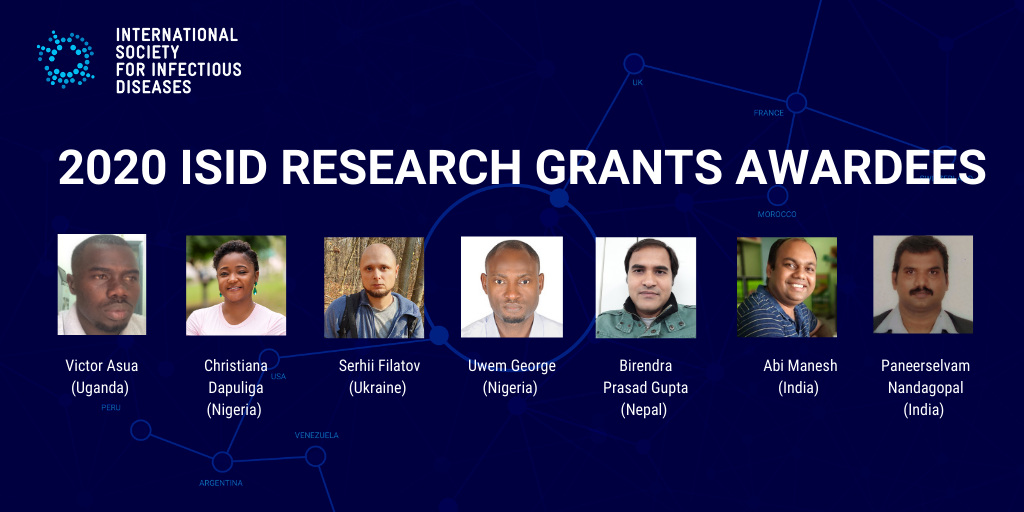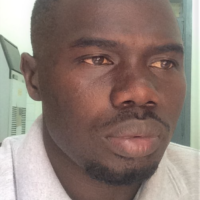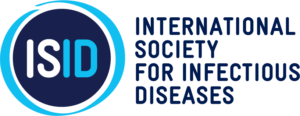Congratulations to the 2020 ISID Research Grants Awardees! Through funding of pilot research projects by young investigators from resource-limited countries, this program supports the professional development of individuals in the field of human infectious diseases research.
2020 ISID Research Grants Awardees


Victor Asua (Uganda)
Origin and Spread of Potentially Highly Resistant Malaria Parasites in Uganda
Victor Asua is an early Career Research Scientist at the Infectious Disease Research Collaboration in Uganda. His current research work is on the evolution of malaria parasite response to antimalarial drugs in Uganda. He has a strong background in laboratory research and molecular epidemiology. Victor is a recipient of the Government of Uganda Merit Scholarship award, the Fogarty International Center Malaria Research Fellowship award, and in 2018, he was honored as young Investigator of the year 2017 by the Infectious Disease Research Collaboration. He obtained a Master's Degree in Immunology and Clinical Microbiology and a Bachelor of Science degree in Biomedical Laboratory Technology from Makerere University.

Christiana Dapuliga (Nigeria)
Biocontrol of Multi-drug Resistant Salmonella spp in Using Lytic Bacteriophages
Christiana Dapuliga is a young microbiologist at the Kwame Nkrumah University of Science and Technology, Ghana. She is currently pursuing her doctoral degree at the University of Ibadan, Nigeria, where she is exploring the use of lytic phages as biocontrol for foodborne pathogens including Salmonella and Shiga toxin producing E. coli. Christiana is goal oriented and passionate about research. She worked closely with Phages for Global Health, a USA based organization in 2019 to host the first West African Phage workshop in Ghana. She is a beneficiary of several training and workshop programs, including the Wellcome Genome Campus Advanced Courses on antimicrobial resistance, the West African Centre for Cell Biology of Infectious Pathogens (WACCBIP) training on neglected tropical diseases, and a NEF-NVRI (Africa Education Initiative, a US based foundation in collaboration with the National Veterinary Research Institute) Toxicology Internship Program. She is also a recipient of the 2019 WARA (West African Research Association) fall grant and the 2020 AGNES-PAWS (African-German Network of Excellence in Science Programme Advocating Women in Science, Technology, Engineering and Mathematics) mobility grant.

Serhii Filatov (Ukraine)
A pilot study to Isolate and Characterize the Antigenic Diversity of Tick-borne Relapsing Fever Borrelia Caucasica with a Low-cost, Culture-free Method
Serhii Filatov is a veterinarian and has worked as a vector biologist at the National Scientific Center Institute of Experimental & Clinical Veterinary Medicine, in Kharkiv, Ukraine. During his PhD work, he was involved in epidemiological risk analysis and surveillance activities for a potential biological vector of African swine fever virus in Ukraine. These experiences have sparked his interest in Ornithodoros soft ticks, which are elusive bloodsucking parasites and vectors of emerging pathogens (e.g., relapsing fever/RF Borrelia spp). Because there is a worldwide shortage of researchers with expertise in soft tick biology, Dr. Filatov focused on acquiring skills necessary to conduct field surveys for Ornithodoros spp., to maintain their colonies in a laboratory, and to study their interactions with pathogens. He has successfully collaborated with international experts in the field to study the geographical distribution and potential vectorial role of soft ticks in Eastern Europe. The current focus of his research is on tick bionomics, physiology, and their intersection with the ecology of RF Borrelia at different scales. In addition to ticks, Dr. Filatov has experience in faunistics and taxonomy of Diptera vectors (Ceratopogonidae, Tabanidae, Culicidae) and also interest in applying methods of spatial epidemiology, ecological modelling, and biogeography to gain a deeper understanding of arthropod-borne pathogens and their vectors.

Uwem George (Nigeria)
Viral Hemorrhagic Fever and the Potential Threat of Bat Viruses to Human Health in Nigeria
Uwem George has a Bachelor of Science in Microbiology from the University of Calabar and a Master’s degree in Virology from the University of Ibadan, Nigeria. He is currently a PhD student/Research Fellow at the African Centre of Excellence for Genomics of infectious diseases, Redeemer’s University, where he and his colleagues carry out rapid detection of infectious agents, including the recent SARS-CoV-2 using Next-generation sequencing. His research focuses on ecology of bats, their viral diversity, and the potential threat to human sympatric population in Nigeria.

Birendra Prasad Gupta (Nepal)
Biomarkers of Dengue Disease Severity in Nepal
Birendra Prasad Gupta is a medical virologist. He obtained his PhD from the Tribhuvan University, in Nepal and worked on the molecular epidemiology of Dengue viruses and hepatitis E virus during his doctoral research. He graduated from the National Institute of Virology, Pune, India with a degree in medical virology where he worked on the seroprevalence of Japanese encephalitis virus in Uttar Pradesh, India. More recently, Dr. Gupta’s research focused on the identification of novel biomarkers for Flaviviruses. In addition, Dr. Gupta worked as a consultant to set up a diagnostic research laboratory as part of a phase III typhoid conjugate vaccine clinical trial in Nepal.

Abi Manesh (India)
Genomic Biomarkers for Predicting Outcomes with Colistin Therapy in Colistin Susceptible Carbapenamase Producing Klebsiella infections
Abi Manesh is a Clinical Faculty member in the Infectious Diseases Department at Christian Medical College, Vellore, India, and keen to establish himself as a clinical academic focusing on antimicrobial resistance. He completed his infectious diseases training in 2019. His research interests include novel approaches to the management of serious Gram-negative multidrug-resistant infections and use of immunomodulatory agents in CNS infections, specifically TB meningitis.

Paneerselvam Nandagopal (India)
Association of Human Pegivirus Infection and Inflammation in PWID (people who inject drugs) Cohort with HIV Infection
Paneerselvam Nandagopal is an Assistant Professor and Immunologist, at the YRG Centre for AIDS Research and Education (YRG CARE) in India, and has been involved in HIV research for more than 8 years. He has a broad background in the field of serology and immunology of infectious diseases, specifically HIV and hepatitis viruses. He completed his PhD program at YRG CARE, which is affiliated with the University of Madras and his PhD topic is “HIV-1 humoral immune response among HIV-1 subtype C infected individuals from Southern India.” His current area of interest is to study HIV/HBV/HCV viral interactions among hard to reach populations such as men who have sex with men (MSM) and people who inject drugs (PWID), especially “ Molecular characteristics of HIV and HPgV viruses from high risk individuals (MSM and PWID) across India.”
Other research projects include:
- “GHAVE (Global HIV/AIDS Vaccine Enterprise) Comprehensive Antibody Vaccine Immune Monitoring Consortium” sponsored by Bill & Melinda Gates Foundation and in this connection Dr. Nandagopal has been trained on neutralization antibody assays at the “Laboratory for AIDS Vaccine Research & Development”, at Duke University Medical Center, USA
- Indian Council of Medical Research ICMR) funded research entitled “Immunological correlates of disease progression in HIV-1 infected long term non-progressors (LTNPs).”
